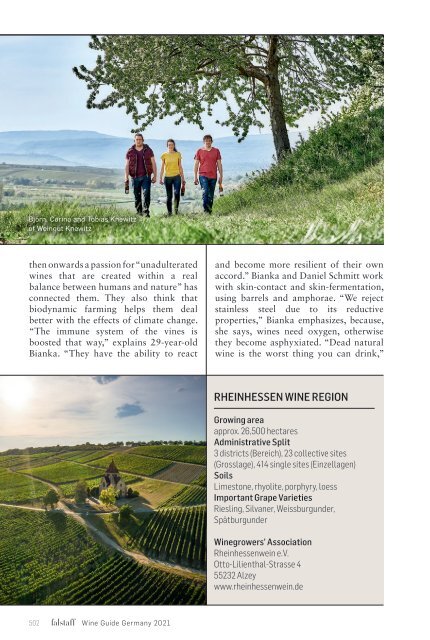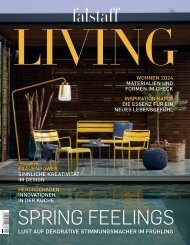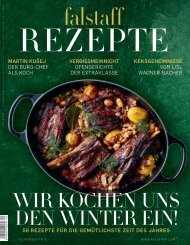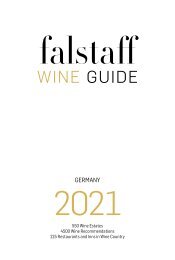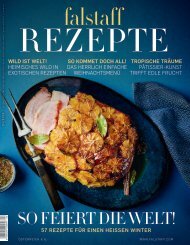- Page 1 and 2:
falstaff WINE GUIDE GERMANY 2021 55
- Page 4 and 5:
EDITORIAL DEAR READERS! Wolfgang M.
- Page 6 and 7:
OVERVIEW HOW TO READ THIS GUIDE The
- Page 8:
OVERVIEW KEY TO SCORES AND LIST OF
- Page 11 and 12:
TASTING PANEL AXEL BODE Photographe
- Page 13 and 14:
TASTING PANEL Bavarian girl activel
- Page 16 and 17:
WINE RANGE OF THE YEAR ‘Each vine
- Page 18:
WINE RANGE OF THE YEAR 2021 Helmut
- Page 21 and 22:
Stefanie and Fabian Lassak have run
- Page 23 and 24:
VINCENT EYMANN | GÖNNHEIM, PFALZ A
- Page 25 and 26:
Christian and Alexandra Ehrlich - f
- Page 29 and 30:
AHR PROTAGONISTS OF A NEW STYLE Pho
- Page 31 and 32:
AHR | A PORTRAIT OF THE REGION desi
- Page 33 and 34:
AHR | GRANDS CRUS Rech, Herrenberg
- Page 35 and 36:
AHR | GRANDS CRUS 94 2016 Spätburg
- Page 37 and 38:
WEINGUT BROGSITTER Ahr | WINERIES M
- Page 39 and 40:
WEINGUT DEUTZERHOF Ahr | WINERIES D
- Page 41 and 42:
MAIBACHFARM Ahr | WINERIES Im Maiba
- Page 43 and 44:
WEINGUT MEYER-NÄKEL Ahr | WINERIES
- Page 45 and 46:
WEINGUT ERWIN RISKE Ahr | WINERIES
- Page 47 and 48:
Ahr | WINERIES WEINGUT PAUL SCHUMA
- Page 49 and 50:
WEINGUT JEAN STODDEN Ahr | WINERIES
- Page 51:
Steinheuers Poststuben 53474 Bad N
- Page 54 and 55:
View of the Schambachtal: home of W
- Page 56 and 57:
Anne-Christin and Christoph Trautwe
- Page 58 and 59:
a 20% incline, its steepest up to 8
- Page 60 and 61:
WINZERGENOSSENSCHAFT ACHKARREN IM K
- Page 62 and 63:
BÄRMANN Kirchgasse 38, 79291 Merdi
- Page 64 and 65:
REINER BAUMANN WEINBAU Kopernikusst
- Page 66 and 67:
WEINGUT BERCHER Mittelstadt 13, 792
- Page 68 and 69:
WEINGUT BIMMERLE Kirchstrasse 4, 77
- Page 70 and 71:
WEINGUT BRENNEISEN Am Weiler Weg 2,
- Page 72 and 73:
WEINGUT CLAUSS Obere Dorfstrasse 39
- Page 74 and 75:
WEINGUT HOLGER DÜTSCH Sankt-Michae
- Page 76 and 77:
STAATSWEINGUT FREIBURG Merzhauser S
- Page 78 and 79:
MAX GEITLINGER WEIN Am Neuweg 2, 79
- Page 80 and 81:
WEINGUT GREINER Bürgler Strasse 48
- Page 82 and 83:
WEINGUT HEINEMANN Mengener Strasse
- Page 84 and 85:
WEINGUT HISS Hauptstrasse 31, 79356
- Page 86 and 87:
WEINGUT HONOLD Am Hummelberg 1, 766
- Page 88 and 89:
WEIN- UND SEKTGUT HUMMEL INHABER DA
- Page 90 and 91:
WEINGUT GEBR. MATHIS KALKBÖDELE En
- Page 92 and 93:
WEINGUT HARALD KEMPF Oberer Mühlwe
- Page 94 and 95:
WEINGUT KLUMPP Heidelberger Strasse
- Page 96 and 97:
WEINGUT KNAPP Gunzenbachstrasse 17b
- Page 98 and 99:
LÄMMLIN-SCHINDLER Müllheimer Stra
- Page 100 and 101:
MAIER BIO WEINGUT BADEN Karlsruher
- Page 102 and 103:
WEINGUT MARKGRAF VON BADEN Schloss
- Page 104 and 105:
STAATSWEINGUT MEERSBURG Seminarstra
- Page 106 and 107:
WEINGUT MOOSMANN Schwarzwaldstrasse
- Page 108 and 109:
KAISERSTÜHLER WINZERVEREIN OBERROT
- Page 110 and 111:
PRIVAT-SEKTKELLEREI REINECKER Klein
- Page 112 and 113:
WEINGUT SALWEY Hauptstraße 2, 7923
- Page 114 and 115:
PRIVAT-WEINGUT SCHLUMBERGER-BERNHAR
- Page 116 and 117:
WEINGUT SCHNEIDER-PFEFFERLE Kolping
- Page 118 and 119:
SHELTER WINERY Salzmatten 1, 79341
- Page 120 and 121:
DEMETER WEINGUT KLAUS VORGRIMMLER S
- Page 122 and 123:
WEINGUT FRITZ WASSMER Lazariterstra
- Page 124 and 125:
WEINGUT WÖHRLE Weinbergstrasse 3,
- Page 126 and 127:
WEINGUT HANSPETER ZIEREISEN Markgra
- Page 128 and 129:
WEINGUT JULIUS ZOTZ Staufener Stras
- Page 130 and 131:
Die Klosterschänke 76530 Baden-Ba
- Page 132 and 133:
Ponyhof Stammhaus 77723 Gengenbach
- Page 134 and 135:
Spielweg 79244 Münstertal Seasonal
- Page 137 and 138:
Photo: WSNA FRANKEN A RAINBOW OF WI
- Page 139 and 140:
FRANKEN | A PORTRAIT OF THE REGION
- Page 141 and 142:
FRANKEN | A PORTRAIT OF THE REGION
- Page 143 and 144:
FRANKEN | GRANDS CRUS 91 2018 Sylva
- Page 145 and 146:
Franken | WINERIES WEINGUT STEFAN
- Page 147 and 148:
Franken | WINERIES WEINGUT BRÖNNE
- Page 149 and 150:
Franken | WINERIES FÜRSTLICH CAST
- Page 151 and 152:
WEINGUT FISCHER Franken | WINERIES
- Page 153 and 154:
Franken | WINERIES WEINGUT RUDOLF
- Page 155 and 156:
WEINGUT HILLABRAND Franken | WINERI
- Page 157 and 158:
WEINBAU HOFMANN Franken | WINERIES
- Page 159 and 160:
Franken | WINERIES WEINGUT JULIUSS
- Page 161 and 162:
Franken | WINERIES WEINGUT FÜRST
- Page 163 and 164:
Franken | WINERIES WEINGUT MEIER S
- Page 165 and 166:
Franken | WINERIES WEINGUT MEINTZI
- Page 167 and 168:
WEINGUT NEUBERGER Franken | WINERIE
- Page 169 and 170:
WEINGUT RÖMMERT Franken | WINERIES
- Page 171 and 172:
WEINGUT ROTHE Franken | WINERIES He
- Page 173 and 174:
Franken | WINERIES WEINGUT RAINER
- Page 175 and 176:
Franken | WINERIES WEINGUT TROCKEN
- Page 177 and 178:
WEINGUT SCHWAB Franken | WINERIES B
- Page 179 and 180:
WINZERHOF STAHL Franken | WINERIES
- Page 181 and 182:
Franken | WINERIES WEINGUT STÖRRL
- Page 183 and 184:
WEINGUT THEN Franken | WINERIES Hau
- Page 185 and 186:
Franken | WINERIES WEINGUT HANS WI
- Page 187 and 188:
FRANKEN | INNS AND RESTAURANTS Esch
- Page 189 and 190:
Grünes Stüble 97999 Igersheim The
- Page 191:
FRANKEN | INNS AND RESTAURANTS 9787
- Page 194 and 195:
Burg Gutenfels - a single site name
- Page 196 and 197:
Christiane Lambrich-Henrich and her
- Page 198 and 199:
KOBLENZ Mosel Rhine Selected Grand
- Page 200 and 201:
KAY WEINE Bergstrasse 45, 53639 Kö
- Page 202 and 203:
WEINGUT LANIUS-KNAB Mainzer Strasse
- Page 204 and 205:
WEINGUT AUGUST PERLL Oberstrasse 77
- Page 206 and 207:
WEINGUT RATZENBERGER Blücherstrass
- Page 208 and 209:
Altkölnischer Hof 55422 Bacharach
- Page 210 and 211:
Zum Kronprinzen 55430 Oberwesel Th
- Page 213 and 214:
Photos: Weingut Van Volxem MOSEL QU
- Page 215 and 216:
MOSEL | A PORTRAIT OF THE REGION es
- Page 217 and 218:
MOSEL | GRANDS CRUS Front left: Wü
- Page 219 and 220:
MOSEL | GRANDS CRUS 93 2019 Rieslin
- Page 221 and 222:
MOSEL | GRANDS CRUS The Kanzemer Al
- Page 223 and 224:
WEINGUT BAUER Mosel | WINERIES Mose
- Page 225 and 226:
ERBEN VON BEULWITZ Mosel | WINERIES
- Page 227 and 228:
Mosel | WINERIES WEINGUT RICHARD B
- Page 229 and 230:
Mosel | WINERIES WEINGUT CLEMENS B
- Page 231 and 232:
Mosel | WINERIES WEINGUT CASPARI-K
- Page 233 and 234:
Mosel | WINERIES WEINGUT MARTIN CO
- Page 235 and 236:
Mosel | WINERIES WEINGUT REINHOLD
- Page 237 and 238:
WEINGUT GEIERSLAY Mosel | WINERIES
- Page 239 and 240:
WEINGUT HAIN Mosel | WINERIES Am Do
- Page 241 and 242:
CLASSISCHES WEINGUT HOFFRANZEN Schu
- Page 243 and 244:
Mosel | WINERIES BIOWEINGUT HUBERT
- Page 245 and 246:
Mosel | WINERIES WEINGUT KARTHÄUS
- Page 247 and 248:
Mosel | WINERIES WEINGUT NIKOLAUS
- Page 249 and 250:
WEINGUT CARL LOEWEN Mosel | WINERIE
- Page 251 and 252:
WEINGUT LORENZ Mosel | WINERIES Neu
- Page 253 and 254:
Mosel | WINERIES WEINGUT MARKUS MO
- Page 255 and 256:
WEIN+GUT OSTER Mosel | WINERIES Bac
- Page 257 and 258:
WEINGUT PAULINSHOF Mosel | WINERIES
- Page 259 and 260:
WEINGUT S. A. PRÜM Mosel | WINERIE
- Page 261 and 262:
WEINGUT F. J. REGNERY Mosel | WINER
- Page 263 and 264:
WEINGUT REVERCHON Mosel | WINERIES
- Page 265 and 266:
Mosel | WINERIES WEINGUT SCHLOSS S
- Page 267 and 268:
Mosel | WINERIES STUDERT-PRÜM-MAX
- Page 269 and 270:
Mosel | WINERIES WEINGUT MICHAEL T
- Page 271 and 272:
VAN VOLXEM Mosel | WINERIES Zum Sch
- Page 273 and 274:
WEINGÜTER WEGELER GUTSHAUS MOSEL M
- Page 275 and 276:
WEINGUT WÜRTZBERG Mosel | WINERIES
- Page 277 and 278:
MOSEL | INNS AND RESTAURANTS Rüsse
- Page 279:
MOSEL | INNS AND RESTAURANTS Petry
- Page 282 and 283:
View of the Traiser Bastei MORE XYL
- Page 284 and 285:
The new generation at Weingut Dr. C
- Page 286 and 287:
Niederhausen, Hermannshöhle - wine
- Page 288 and 289:
Schlossböckelheimer Kupfergrube -
- Page 290 and 291:
WEIN- UND SEKTGUT BAMBERGER Römers
- Page 292 and 293:
SCHLOSSGUT DIEL Burg Layen 16, 5545
- Page 294 and 295:
WEINGUT DÖNNHOFF Bahnhofstrasse 11
- Page 296 and 297:
WEINGUT GROSSARTH Staudernheimer St
- Page 298 and 299:
WEINGUT IN DEN ZEHN MORGEN In den Z
- Page 300 and 301:
WEINGUT LINDENHOF MARTIN REIMANN Li
- Page 302 and 303:
WEINGUT MICHEL Kreuznacher Strasse
- Page 304 and 305:
REICHSGRAF VON PLETTENBERG Im Winge
- Page 306 and 307:
WEINGUT PRINZ SALM Schlossstrasse 3
- Page 308 and 309:
WEINGUT SCHÄFER-FRÖHLICH Schulstr
- Page 310 and 311:
SM SEKTMANUFAKTUR Grosse Heide 2, 5
- Page 312 and 313:
WEINGUT KARL STEIN Auf dem Stiel 12
- Page 314 and 315:
Bad Kreuznach PASSIONATE HOSTS TOGE
- Page 316 and 317:
Zur Traube 55566 Meddersheim Herber
- Page 319 and 320:
PFALZ A MAGNET FOR WINE LOVERS Phot
- Page 321 and 322:
PFALZ | A PORTRAIT OF THE REGION Gu
- Page 323 and 324:
PFALZ | GRANDS CRUS Deidesheim, Kal
- Page 325 and 326:
PFALZ | GRANDS CRUS Zell Grünstadt
- Page 327 and 328:
Pfalz | WINERIES WEINGUT JÜRGEN A
- Page 329 and 330:
WEINGUT ANDRES Pfalz | WINERIES Wei
- Page 331 and 332:
WEINGUT BÄRENHOF Pfalz | WINERIES
- Page 333 and 334:
Pfalz | WINERIES WEINGUT FRIEDRICH
- Page 335 and 336:
WEINGUT BERGDOLT Pfalz | WINERIES D
- Page 337 and 338:
WEINGUT BERNHART Pfalz | WINERIES H
- Page 339 and 340:
WEINGUT BRAUN Pfalz | WINERIES Haup
- Page 341 and 342:
WEINGUT BUCHERT Pfalz | WINERIES Zu
- Page 343 and 344:
Pfalz | WINERIES WEINGUT A. CHRIST
- Page 345 and 346:
Pfalz | WINERIES WEINGUT DENGLER-S
- Page 347 and 348:
WEINGUT EYMANN Pfalz | WINERIES Lud
- Page 349 and 350:
Pfalz | WINERIES WEINGUT STEFAN FI
- Page 351 and 352:
Pfalz | WINERIES WEINGUT MARTIN &
- Page 353 and 354:
DER GLÜCKSJÄGER Pfalz | WINERIES
- Page 355 and 356:
WEINGUT GRASSMÜCK Pfalz | WINERIES
- Page 357 and 358:
WEINHAUS FRANZ HAHN Pfalz | WINERIE
- Page 359 and 360:
Pfalz | WINERIES WEINGUT HANEWALD-
- Page 361 and 362:
WEINGUT HOF Pfalz | WINERIES Klingb
- Page 363 and 364:
WEINGUT JÜLG Pfalz | WINERIES Haup
- Page 365 and 366:
Pfalz | WINERIES WEINGUT KASSNER-S
- Page 367 and 368:
WEINGUT JOSEF KÖHR Pfalz | WINERIE
- Page 369 and 370:
WEINGUT KREBS Pfalz | WINERIES Gros
- Page 371 and 372:
WEINGUT PHILIPP KUHN Pfalz | WINERI
- Page 373 and 374:
WEINGUT LAUERMANN UND WEYER Pfalz |
- Page 375 and 376:
WEINGUT LEILING Pfalz | WINERIES Ha
- Page 377 and 378:
Pfalz | WINERIES WEINGUT LERGENMÜ
- Page 379 and 380:
Pfalz | WINERIES WEINGUT MARGARETH
- Page 381 and 382:
WEINGUT MEIER Pfalz | WINERIES Hüb
- Page 383 and 384:
Pfalz | WINERIES WEINGUT KARL-HEIN
- Page 385 and 386:
WEINGUT STEFAN MEYER Pfalz | WINERI
- Page 387 and 388:
Pfalz | WINERIES WEINGUT GEORG MOS
- Page 389 and 390:
WEINGUT MÜNZBERG Pfalz | WINERIES
- Page 391 and 392:
WEINGUT NEHB Pfalz | WINERIES Im Au
- Page 393 and 394:
WEINGUT AM NIL Pfalz | WINERIES Neu
- Page 395 and 396:
WEINGUT OBERHOFER Pfalz | WINERIES
- Page 397 and 398:
Pfalz | WINERIES WEINGUT HEINZ PFA
- Page 399 and 400:
WEINGUT PFEFFINGEN Pfalz | WINERIES
- Page 401 and 402:
WEINGUT REIBOLD Pfalz | WINERIES Wa
- Page 403 and 404:
WEINGUT RINCK Pfalz | WINERIES Klin
- Page 405 and 406:
WEINGUT FAMILIE SAUER Pfalz | WINER
- Page 407 and 408:
WEINGUT SCHWEDER Pfalz | WINERIES H
- Page 409 and 410:
WEINGUT SECKINGER Pfalz | WINERIES
- Page 411 and 412:
Pfalz | WINERIES WEINGUT ERICH STA
- Page 413 and 414:
Pfalz | WINERIES WEINGUT PETER ST
- Page 415 and 416:
WEINGUT VILLA HOCHDÖRFFER Pfalz |
- Page 417 and 418:
Pfalz | WINERIES WEINGUT FELIX WAL
- Page 419 and 420:
WEINBIET MANUFAKTUR Pfalz | WINERIE
- Page 421 and 422:
WEINGUT KATRIN WIND Pfalz | WINERIE
- Page 423 and 424:
Pfalz | WINERIES WEINGUT JOSEF WÖ
- Page 425 and 426:
WEINGUT ZELT Pfalz | WINERIES Binse
- Page 427 and 428:
PFALZ | INNS AND RESTAURANTS Neusta
- Page 429 and 430:
PFALZ | INNS AND RESTAURANTS L.A. J
- Page 431 and 432:
Pfälzer Stuben im Hotel Krone 768
- Page 433:
Bauer’s Stuben 67482 Venningen T
- Page 436 and 437:
With its 70% incline, the Rüdeshei
- Page 438 and 439:
Good vibes in the historic, vaulted
- Page 440 and 441:
A small Spätburgunder enclave with
- Page 442 and 443:
92 2019 Riesling trocken Weingut Dr
- Page 444 and 445:
WEINGUT FRITZ ALLENDORF Kirchstrass
- Page 446 and 447:
WEIN- UND SEKTGUT BARTH Bergweg 20,
- Page 448 and 449:
WEINGUT KONRAD BERG & SOHN Niederwa
- Page 450 and 451: WEINGUT GEORG BREUER Geisenheimer S
- Page 452 and 453: WEINGUT CHAT SAUVAGE SCHULZ & SCHÖ
- Page 454 and 455: WEINGUT DIEFENHARDT Hauptstrasse 9-
- Page 456 and 457: WINZER VON ERBACH Ringstrasse 28, 6
- Page 458 and 459: WEINGUT JOACHIM FLICK In der Strass
- Page 460 and 461: WEINGUT EVA FRICKE Elisabethenstras
- Page 462 and 463: DOMÄNE SCHLOSS JOHANNISBERG Schlos
- Page 464 and 465: WEINGUT JAKOB JUNG Eberbacher Stras
- Page 466 and 467: KLOSTER EBERBACH Kloster Eberbach ,
- Page 468 and 469: WEINGUT KRONE ASSMANNSHAUSEN Nieder
- Page 470 and 471: WEINGUT KÜNSTLER Geheimrat-Hummel-
- Page 472 and 473: MEHRLEIN Rieslingstrasse 49, 65375
- Page 474 and 475: WEINGUT MOHR Rheinstrasse 21, 65391
- Page 476 and 477: WEINGUT HEINZ NIKOLAI Ringstrasse 1
- Page 478 and 479: WEINGUT PRINZ Im Flachsgarten 5, 65
- Page 480 and 481: SCHAMARI MÜHLE Grund 65, 65366 Joh
- Page 482 and 483: WEINGUT SOHNS Hospitalstrasse 25, 6
- Page 484 and 485: WEINGUT JOSEF SPREITZER Rheingaustr
- Page 486 and 487: WEINGUT ROBERT WEIL Mühlberg 5, 65
- Page 488 and 489: GRIESEL & COMPAGNIE Grieselstasse 3
- Page 490 and 491: RHEINGAU, HESSISCHE BERGSTRASSE Ebe
- Page 492 and 493: Burgrestaurant Schwarzenstein 6536
- Page 494 and 495: Zur Schlupp 65396 Walluf In summer
- Page 497 and 498: RHEIN- HESSEN IN THE NAME OF BIODYN
- Page 499: RHEINHESSEN | A PORTRAIT OF THE REG
- Page 503 and 504: RHEINHESSEN | GRANDS CRUS NIERSTEIN
- Page 505 and 506: Rheinhessen | WINERIES WEINGUT ACH
- Page 507 and 508: Rheinhessen | WINERIES WEINGUT ST.
- Page 509 and 510: WEINGUT BEISER Rheinhessen | WINERI
- Page 511 and 512: WEINGUT BOSSERT Rheinhessen | WINER
- Page 513 and 514: Rheinhessen | WINERIES WEINGUT MAR
- Page 515 and 516: WEINGUT LISA BUNN Rheinhessen | WIN
- Page 517 and 518: Rheinhessen | WINERIES WEINGUT DAC
- Page 519 and 520: Rheinhessen | WINERIES WEINGUT EPP
- Page 521 and 522: Rheinhessen | WINERIES WEINGUT FIN
- Page 523 and 524: Rheinhessen | WINERIES WEINGUT FLE
- Page 525 and 526: Rheinhessen | WINERIES GUTGALLÉ R
- Page 527 and 528: Rheinhessen | WINERIES WEINGUT HEL
- Page 529 and 530: Rheinhessen | WINERIES WEINGUT GOL
- Page 531 and 532: Rheinhessen | WINERIES WEINGUT GUN
- Page 533 and 534: WEINGUT GYSLER Rheinhessen | WINERI
- Page 535 and 536: Rheinhessen | WINERIES WEINGUT HEI
- Page 537 and 538: WEINGUT HIESTAND Rheinhessen | WINE
- Page 539 and 540: Rheinhessen | WINERIES WEINGUT FRI
- Page 541 and 542: WEINGUT JÄGER Rheinhessen | WINERI
- Page 543 and 544: KAPELLENHOF Rheinhessen | WINERIES
- Page 545 and 546: WEINGUT KETH Rheinhessen | WINERIES
- Page 547 and 548: Rheinhessen | WINERIES WEINGUT KÖ
- Page 549 and 550: WEINGUT LAMBERTH Rheinhessen | WINE
- Page 551 and 552:
WEINGUT MANZ Rheinhessen | WINERIES
- Page 553 and 554:
WEINGUT MICHEL Rheinhessen | WINERI
- Page 555 and 556:
Rheinhessen | WINERIES WEINGUT MÜ
- Page 557 and 558:
WEINGUT J. NEUS Rheinhessen | WINER
- Page 559 and 560:
Rheinhessen | WINERIES WEINGUT REI
- Page 561 and 562:
WEINGUT SCHÄTZEL Rheinhessen | WIN
- Page 563 and 564:
Rheinhessen | WINERIES WEINGUT BIA
- Page 565 and 566:
WEINGUT STAUFFER Rheinhessen | WINE
- Page 567 and 568:
WEINGUT THÖRLE Rheinhessen | WINER
- Page 569 and 570:
WEINGUT WEBER Rheinhessen | WINERIE
- Page 571 and 572:
Rheinhessen | WINERIES WEINGUT WEE
- Page 573 and 574:
Rheinhessen | WINERIES WEINGUT WIT
- Page 575 and 576:
WEINGUT ZINK - DIE WEINSCHMIEDE Rhe
- Page 577 and 578:
RHEINHESSEN | INNS AND RESTAURANTS
- Page 579 and 580:
Hofgut Laubenheimer Höhe RHEINHES
- Page 581:
Vis à Vis RHEINHESSEN | INNS AND
- Page 584 and 585:
Grosse Gewächse, predominantly of
- Page 586 and 587:
With their for this region downrigh
- Page 588 and 589:
Benedictine monks cultivated vines
- Page 590 and 591:
WEINGUT DREI HERREN Weinbergstrasse
- Page 592 and 593:
ROTHES GUT MEISSEN Lehmberg 4, 0166
- Page 594 and 595:
SACHSEN | WINERIES SÄCHSISCHES ST
- Page 596 and 597:
SAALE-UNSTRUT | WINERIES LANDESWEI
- Page 598 and 599:
SACHSEN, SAALE-UNSTRUT Dresden PASS
- Page 600 and 601:
Genuss Atelier 01099 Dresden The G
- Page 602 and 603:
Atelier Sanssouci 01445 Radebeul A
- Page 605 and 606:
Photo: WSNA WÜRTTEM- BERG UNIQUE C
- Page 607 and 608:
WÜRTTEMBERG | A PORTRAIT OF THE RE
- Page 609 and 610:
WÜRTTEMBERG | GRANDS CRUS The Rems
- Page 611 and 612:
Württemberg | WINERIES WEINGUT GR
- Page 613 and 614:
Württemberg | WINERIES WEINGUT JO
- Page 615 and 616:
Württemberg | WINERIES PANORAMAWE
- Page 617 and 618:
WEINGUT BORTH Württemberg | WINERI
- Page 619 and 620:
Württemberg | WINERIES WEINGÄRTN
- Page 621 and 622:
WEINGUT EHRMANN Württemberg | WINE
- Page 623 and 624:
WEINGUT EISELE Württemberg | WINER
- Page 625 and 626:
Württemberg | WINERIES WEINGUT J
- Page 627 and 628:
Württemberg | WINERIES WEINGÄRTN
- Page 629 and 630:
WEINGUT FRANK Württemberg | WINERI
- Page 631 and 632:
Württemberg | WINERIES WEINGUT UN
- Page 633 and 634:
WEINGUT GOLTER Württemberg | WINER
- Page 635 and 636:
WEINGUT HEID Württemberg | WINERIE
- Page 637 and 638:
Württemberg | WINERIES WEIN & SEK
- Page 639 and 640:
Württemberg | WINERIES WEINGUT HO
- Page 641 and 642:
Württemberg | WINERIES KISTENMACH
- Page 643 and 644:
Württemberg | WINERIES WEINGUT AN
- Page 645 and 646:
WEINGUT LASSAK Württemberg | WINER
- Page 647 and 648:
PARFUM DER ERDE Württemberg | WINE
- Page 649 and 650:
Württemberg | WINERIES SCHMIDT AM
- Page 651 and 652:
Württemberg | WINERIES WEINGUT AL
- Page 653 and 654:
Württemberg | WINERIES WEINGUT ST
- Page 655 and 656:
WEINGUT UNGERER Württemberg | WINE
- Page 657 and 658:
Württemberg | WINERIES WEINGUT VI
- Page 659 and 660:
WEINFACTUM Württemberg | WINERIES
- Page 661 and 662:
Württemberg | WINERIES WEINGUT W
- Page 663 and 664:
WEINGUT ZIPF Württemberg | WINERIE
- Page 665 and 666:
Maerz WÜRTTEMBERG | INNS AND REST
- Page 667 and 668:
Museumsstuben WÜRTTEMBERG | INNS A
- Page 669 and 670:
SPACE FOR YOUR WINE NOTES 671
- Page 671 and 672:
WINE SHOPS AND EMPORIA 89077 Ulm We
- Page 673 and 674:
WINE SHOPS AND EMPORIA 28209 Bremen
- Page 675 and 676:
WINE SHOPS AND EMPORIA SAARLAND 593
- Page 677 and 678:
INDEX | WINE ESTATES WINE ESTATES A
- Page 679 and 680:
INDEX | WINE ESTATES Winzerverein D
- Page 681 and 682:
INDEX | WINE ESTATES Weingut Höffl
- Page 683 and 684:
INDEX | WINE ESTATES Weingut Markgr
- Page 685 and 686:
INDEX | WINE ESTATES S Weingut Schl
- Page 687 and 688:
INDEX | WINE ESTATES Weingut Willem


